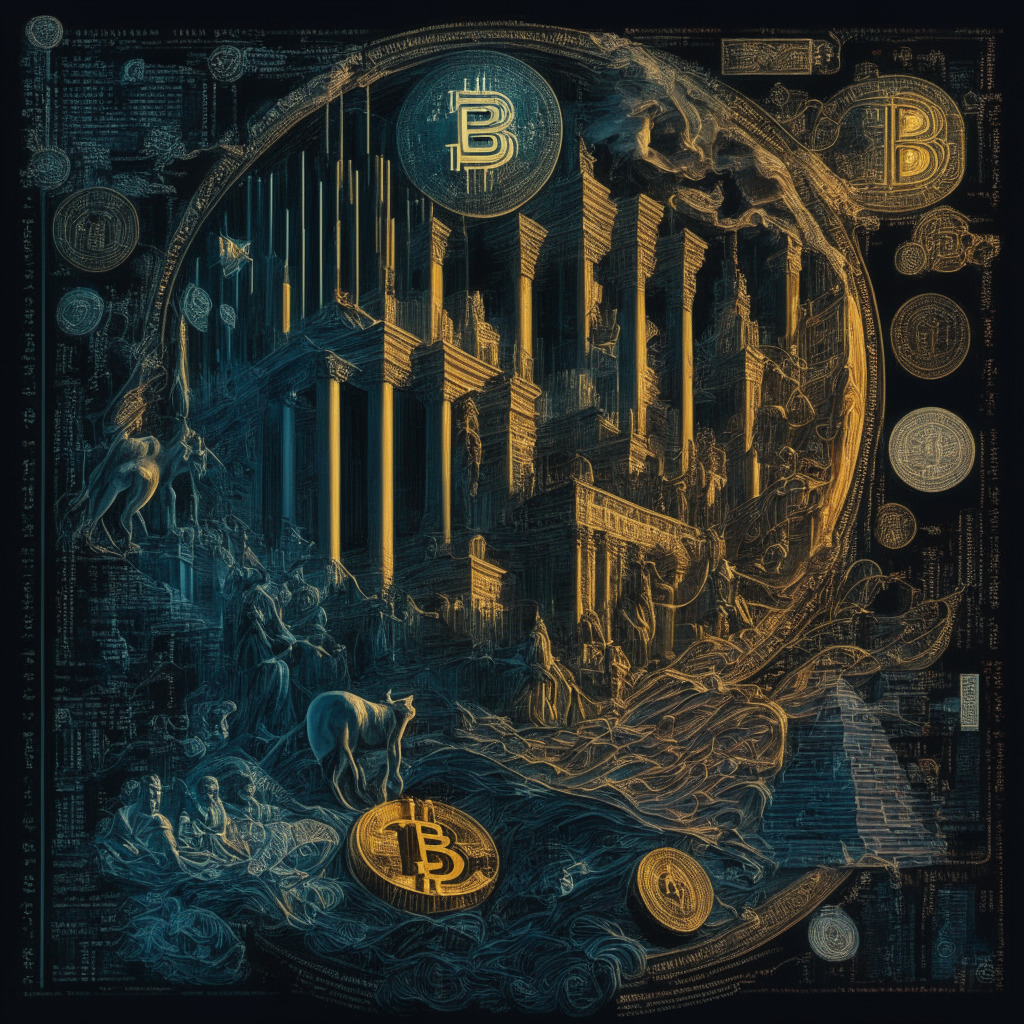“Despite looming regulatory uncertainties and global competition, there’s a surge in institutional demand for Bitcoin, leading to multiple ETF applications. The crypto market remains resilient despite economic uncertainties, reinforcing blockchain’s role as a game-changer, innovator, and boundary-breaker in finance.”
Search Results for: U.S
Fidelity’s BTC ETF Quest: Balancing Regulatory Restraints and Blockchain Promise
“Fidelity Investments makes a second attempt at a spot BTC Trust known as Wise Origin, amidst seven similar fund applications this year. Despite potential risks, they argue for the need of a Spot Bitcoin exchange-traded product, which could protect U.S. investor assets from riskier alternatives. The blockchain future, despite regulatory skepticism, is seen as inevitable.”
Coinbase v. SEC: A Battle for Crypto Regulatory Clarity or Arm-Wrestling for Power?
Coinbase challenges the U.S. SEC stating it lacks jurisdiction to take enforcement actions against it, alleging Coinbase listed unregistered securities. Coinbase refutes this, claiming virtual currencies on its platform do not qualify as securities and it operates as a secondary market. The ongoing legal tussle underscores the need for clearer regulatory guidance in the digital asset industry.
Navigating SEC Approval: The Strategic Moves of ARK Invest and 21Shares for BTC ETFs
ARK Invest and 21Shares recently revised their Bitcoin ETF proposal, adding a surveillance-sharing agreement with CBOE BZX Exchange to prevent market manipulation – a move designed to help secure SEC approval. Including such agreements could enhance crypto market transparency and align it with traditional US markets.
Fidelity and BlackRock’s Spot BTC ETF: A Game-Changer or an Exercise in Futility?
“Fidelity and BlackRock’s iShares unit have submitted applications for spot BTC ETFs, indicating growing institutional interest in cryptocurrency markets. With the SEC yet to pass judgment, these applications represent a commitment to embracing disruptive blockchain technology, potentially reshaping the landscape of cryptocurrency regulation.”
Emerging Investment Opportunities as 3iQ Leads in Ether Staking: Rewarding or Risky Endeavour?
Toronto-based digital asset manager 3iQ is pioneering Ether (ETH) staking for the first time in North America’s ETF industry. By collaborating with Coinbase’s staking infrastructure, 3iQ aims to provide high-yield savings rate-like opportunities for investors. However, lack of regulatory clarity and price volatility often present challenges.
Navigating Crypto Regulation: Rpay’s License Triumph and its Ramifications for Global Crypto Trade
“Stablecoin wallet Rpay secured a key license from the U.S. Office of Foreign Asset Control (OFAC), allowing operations in Venezuela. This indicates a potential shift in regulatory landscape despite crypto firms previously exiting due to complexities and in-house risk tolerance.”
Untangling the Binance Controversy: Regulatory Compliance VS Cryptocurrency Exchanges
Yi He, co-founder of Binance, defends the crypto trading platform’s commitment to regulatory compliance amidst lawsuits from the CFTC and SEC. Despite accusations of market manipulation, He upholds Binance’s transparency and cooperation with U.S. regulators. Her statement surfaces important debates about the relationship between crypto exchanges and regulatory compliance.
Crypto Frontier: Julius Baer Expands Digital Assets Services to Dubai
Swiss private bank, Julius Baer, plans to expand its crypto services to Dubai, marking its first move outside Switzerland for crypto offerings. This initiative is attributed to Dubai’s progressive approach towards digital assets regulation and its establishment of the Virtual Asset Regulatory Authority. Yet, with crypto expansion come risks, including volatility and potential fraud.
Regulation Wars: Coinbase’s Showdown with SEC and Binance’s License Denial in Germany
“Crypto-exchange Coinbase faces the U.S. Securities and Exchange Commission (SEC) over allegations some cryptocurrencies offered are unregistered securities. Meanwhile, Binance encounters difficulties getting a custody license from the German Federal Financial Supervisory Authority. With this, the saga of crypto regulation continues highlighting the tension between investor protection and market innovation.”
FTX Founder’s Criminal Trial Progress: A Battle Between Crypto Innovation and Regulation
FTX founder Sam Bankman-Fried’s trial faces multiple criminal charges, including wire fraud and bank fraud, highlighting the ongoing debate surrounding cryptocurrency regulations. The case emphasizes the struggle between emerging digital assets and traditional financial regulations, potentially shaping the landscape of cryptocurrency regulations and the digital asset market.
Grayscale vs SEC: The Battle for Bitcoin ETF Approval and Its Impact on Crypto Market
The Grayscale Bitcoin Trust (GBTC) experiences a surge in trading volume amid increasing attention towards Bitcoin ETFs. Experts suggest that the SEC may soon approve Grayscale’s Bitcoin ETF application. Grayscale currently has a 70% chance of winning their lawsuit against the SEC, potentially forcing ETF approval by August 2023.
Recovering $1.3B from 3AC Founders: The Dark Side of Crypto Market and Its Impact on Investors
Teneo liquidators are seeking to recover $1.3 billion from Three Arrows Capital founders Su Zhu and Kyle Davies, who reportedly incurred the debt while the hedge fund was insolvent. This case highlights the challenges in the expanding crypto world and emphasizes the need for increased oversight and regulation to ensure investor safety.
Tokyo and Hong Kong: Rising Crypto Hubs or Regulatory Challenges? Pros and Cons Debated
Tokyo and Hong Kong are emerging as prominent crypto hubs as they proactively attract crypto businesses and implement regulatory safeguards. Despite challenges, their clear support for the industry signals a shifting landscape and underscores the importance of adaptability in the crypto ecosystem.
June 2023: Game Changer for Bitcoin ETFs as Major Corporations Join In – Pros and Cons
June 2023 marks a pivotal moment for Bitcoin ETFs as major corporations like Blackrock, Invesco, WisdomTree, and Bitwise submit applications to the SEC. This could boost the crypto market and potentially alter cryptocurrency perception among traditional financial market participants.
Fidelity’s Bitcoin ETF Pushes BTC Above $31K: Bullish Future or Short-Lived Rally?
Bitcoin price surges above $31,000, driven by rumors of Fidelity Investments filing for a Bitcoin spot-based ETF. Analysts anticipate possible surge to $38,000 if price holds between $32,000-$33,000. Despite skepticism, the overall sentiment leans towards a bullish trend.
XRP Lawsuit, Ripple’s Legal Battle and the Significance of Amicus Briefs in Crypto Regulations
The XRP lawsuit filed by the SEC against Ripple Labs impacts prices and businesses, while XRP holders’ lawyer, John Deaton, invests in Amicus Curiae SpendTheBits. This highlights the risks, regulations, and complexities in the cryptocurrency market, emphasizing the need for trust and integrity in blockchain development.
Binance vs SEC: Ongoing Legal Battle, Court Rulings, and Future Implications for Crypto
A U.S. District Court judge denied Binance’s motion to hinder the SEC from publicizing statements related to their ongoing legal dispute. The case involves allegations, including securities law violations and commingling of user funds. Binance is set to present its defense on September 21.
Bitcoin ETFs: Navigating Regulatory Hurdles and Future Prospects in the US Market
Circle CEO Jeremy Allaire anticipates regulatory approvals for Bitcoin ETFs as concerns raised by financial watchdogs are addressed, creating a more mature market environment. Regulated custody infrastructure and efficient market surveillance contribute to the growing optimism for approval.
Bitcoin Bulls vs $30,000 Support: Analyzing Traders’ Positions Amid Crypto Gains and Regulations
Bitcoin bulls have leveraged long positions using margin and futures markets, backed by positive momentum from spot Bitcoin ETF requests, heavy institutional inflow, and improved U.S. regulatory perspectives. This support helps sustain the $30,000 BTC price level in the coming weeks.
XRP: The Odd One Out Amid Crypto Rally – Factors to Consider
XRP displayed a decline amid the recent crypto market rally but showed mildly bullish indications and a 42% YTD increase. However, the ongoing SEC lawsuit still poses a potential challenge for XRP, making it crucial for investors to monitor the case closely.
$27 Trillion Institutions Eye Crypto: Excitement or Skepticism for Blockchain Future?
At least $27 trillion of assets managed by major U.S. financial institutions, including BlackRock, Fidelity, and Goldman Sachs, are actively seeking to provide clients with exposure to Bitcoin and crypto. However, only a tiny portion would likely be allocated to crypto investments, and skepticism remains regarding the potential impact of institutional interest on the market and technology.
Bitcoin’s Max Pain and AI-Driven Shift: Exploring Crypto Market Developments
Bitcoin holds above $30,000 while Ether trades lower as the crypto market anticipates upcoming quarterly options expiry. Meanwhile, investors shift focus to AI technologies, and financial institutions adopt tokenization as crypto’s new buzzword.
Bitcoin Outperforms S&P 500 and Nasdaq: Are Speculators a Boon or Bane for Crypto Markets?
Bitcoin has surged 83% year-to-date, overtaking the S&P 500 and Nasdaq Composite, and attracting institutional investors with ETFs like ProShares Bitcoin Strategy ETF (BITO). However, as Bitcoin’s supply moves toward speculative investors, it signals increasing mainstream trading interest, which could impact market stability. Investors are encouraged to research and approach cautiously.
Binance vs SEC: Court Denial in Gag Order Bid & What It Means for Crypto Sphere
A U.S. District Court denied a motion to stop the SEC from issuing public statements about Binance’s ongoing legal case, filed by the legal teams of Binance, Binance.US, and CEO Changpeng “CZ” Zhao. The lawsuit alleges unregistered securities offerings to U.S. customers, while Binance faces regulatory hurdles in Europe. The case’s outcome and its potential impact remain undetermined.
Bitcoin’s July Boom: Expert Predictions Amid Market Fluctuations and ETF Approvals
Despite a recent 0.9% decline, experts like Markus Thielen, Head of Research for Matrixport, maintain an optimistic outlook for Bitcoin’s potential growth, especially given its historical July performance. Factors such as Bitcoin ETF approval expectations, options contract expirations, and institutional involvement are contributing to cautious optimism in the crypto market.
Birkin Bag NFT Ruling: A Lesson on Intellectual Property Rights for Digital Creators
In a landmark ruling, a federal judge imposed a permanent ban on a non-fungible token (NFT) creator from selling digital art inspired by Hermes’ Birkin bags. The case highlights the complexities surrounding NFTs, intellectual property rights, and the importance of enforcing such rights in the digital market, prompting conversations on regulations and ethical practices within the industry.
AI in Congress: Striking Balance Between Privacy & Innovation in Legislative Process
The U.S. House of Representatives has limited the use of OpenAI’s ChatGPT to ensure privacy preservation, authorizing only the ChatGPT Plus version under specific conditions. As AI technology advances, striking a balance between AI-driven innovations and privacy protection becomes crucial. Establishing a regulatory framework for AI applications is necessary to support its transformative potential without compromising privacy.
Digital Asset Market Structure: A Path for Crypto Regulation or Hindrance to SEC’s Authority?
House Financial Services Committee Chair Maxine Waters proposed the Digital Asset Market Structure bill, offering US-based digital asset exchanges a pathway for SEC registration, seeking regulatory clarity for the crypto industry. The legislation aims to approve digital securities, commodities, and stablecoins for trading while providing guidelines to distinguish between crypto-based securities and commodities.
Crypto ETFs Surge in Popularity: Bitcoin Dominates, Altcoins Struggle to Keep Pace
Digital asset investment products recently saw their largest single weekly inflows in a year, mainly driven by bitcoin-related products. This follows nine consecutive weeks of outflows, indicating a shift in market sentiment as high-profile institutions file for exchange-traded funds (ETFs).
Hut 8’s $50M Credit Boost: Analyzing HODL Strategy & Merger Implications in Crypto Mining
Canadian Bitcoin mining company Hut 8 Mining recently secured a $50 million credit facility through Coinbase Credit. The funds will be used for general corporate purposes as Hut 8 continues to evolve its Bitcoin treasury management strategy, maintaining its commitment to the “HODL strategy.”































